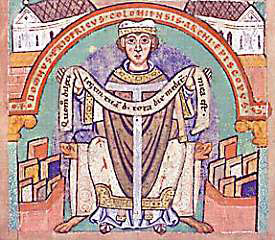1998 Faith and Knowledge
7 August to 15 November 1998
Faith and Knowledge in the Middle Ages
The Cologne Cathedral Library
Surrounded by his boxes of books Archbishop Friedrich I of Cologne (1100-1131) sits upon his throne in the portrait of himself as donor in the manuscript named after him. The 750th anniversary of the Cathedral is the occasion for us to present the wealth of the Cologne Cathedral Library with a selection of more than one hundred manuscripts from the 6th to the 16th centuries. In this collection, basic works of the Western history of thought, some of which are unique, have been preserved as well as very precious liturgical manuscripts, which lent a very special radiance to the celebration of mass. In Friedrich’s time the Cathedral Library could already look back on a long history. The architect of the Carolingian cathedral, Archbishop Hildebald (before 787-818); had acquired the first books in order to ensure the education of the partly illiterate clergy. Both Bible reading and its interpretation by the Fathers of the Church were taught. Legal manuscripts, in which the decrees of early Christian councils were recorded, as well the expositions of venerable leading monks and popes instructed one as to the “right way to live”. But one still could not forego a general education of antiquity or heathen traditions, all of which were intricately-woven into the liberal arts: grammar, rhetoric, mathematics and astronomy. From the 12th century onward, intellectual education was increasingly handed over to the universities which were gradually being founded: Paris, Oxford, Bologna but also Cologne became centres of new thought. New books come about, in which teachers were now respected as the authority. In his “Liber Septentiarum”, Petrus Lombardus (d. 1160) collected thought pertaining to the Holy Scriptures. Gratian (d. 1150) laid a foundation stone in his “Decretum” which is still relevant today in canonical law. The rediscovery of Aristotle’s works led to a violent dispute which ultimately caused the division between philosophy and theology. With the founding of the Dominican studies in the 13th century, the Cologne cathedral school lost some of its importance. However, the increasingly common habit of donations and endowments in the hope that provisions could be made for the afterlife, led to an increasing number of splendid manuscripts used in the liturgy. Hildebald as well as his successors had already acquired the books necessary for the proper celebration of liturgy according to the Roman models, in which early evidence of liturgical development is reflected. In the late Middle Ages the need for illustrated codices grew to an extent which made it possible for monasteries such as the Brothers of Cologne to support themselves financially by producing these manuscripts. This unique exhibition for the anniversary of Cologne Cathedral provides a fascinating insight into the development of faith and knowledge from the early Middle Ages to the beginning of modern times.
(Book publication)
Faith and Knowledge in the Middle Ages
The Cologne Cathedral Library
Surrounded by his boxes of books Archbishop Friedrich I of Cologne (1100-1131) sits upon his throne in the portrait of himself as donor in the manuscript named after him. The 750th anniversary of the Cathedral is the occasion for us to present the wealth of the Cologne Cathedral Library with a selection of more than one hundred manuscripts from the 6th to the 16th centuries. In this collection, basic works of the Western history of thought, some of which are unique, have been preserved as well as very precious liturgical manuscripts, which lent a very special radiance to the celebration of mass. In Friedrich’s time the Cathedral Library could already look back on a long history. The architect of the Carolingian cathedral, Archbishop Hildebald (before 787-818); had acquired the first books in order to ensure the education of the partly illiterate clergy. Both Bible reading and its interpretation by the Fathers of the Church were taught. Legal manuscripts, in which the decrees of early Christian councils were recorded, as well the expositions of venerable leading monks and popes instructed one as to the “right way to live”. But one still could not forego a general education of antiquity or heathen traditions, all of which were intricately-woven into the liberal arts: grammar, rhetoric, mathematics and astronomy. From the 12th century onward, intellectual education was increasingly handed over to the universities which were gradually being founded: Paris, Oxford, Bologna but also Cologne became centres of new thought. New books come about, in which teachers were now respected as the authority. In his “Liber Septentiarum”, Petrus Lombardus (d. 1160) collected thought pertaining to the Holy Scriptures. Gratian (d. 1150) laid a foundation stone in his “Decretum” which is still relevant today in canonical law. The rediscovery of Aristotle’s works led to a violent dispute which ultimately caused the division between philosophy and theology. With the founding of the Dominican studies in the 13th century, the Cologne cathedral school lost some of its importance. However, the increasingly common habit of donations and endowments in the hope that provisions could be made for the afterlife, led to an increasing number of splendid manuscripts used in the liturgy. Hildebald as well as his successors had already acquired the books necessary for the proper celebration of liturgy according to the Roman models, in which early evidence of liturgical development is reflected. In the late Middle Ages the need for illustrated codices grew to an extent which made it possible for monasteries such as the Brothers of Cologne to support themselves financially by producing these manuscripts. This unique exhibition for the anniversary of Cologne Cathedral provides a fascinating insight into the development of faith and knowledge from the early Middle Ages to the beginning of modern times.
(Book publication)
